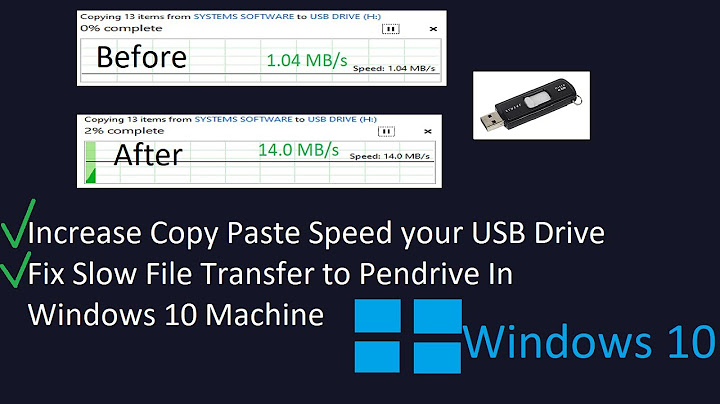Extremely slow data transfer on USB flash drive
I ended up doing everything detailed in the question, and then rebooted and switched ports on the machine. The flash drive jumped back up to a decent speed afterward, which leads me to believe that it's just an issue with the port.
I'm not sure why this worked, but coworkers eventually admitted to not properly ejecting the flash drive when removing it (which is once or twice daily Mon-Sat). I'm not sure what ill effects that might have (especially after doing some research into the read/write bottlenecking that Win7 likes to do to flash drives to minimize the effect of doing so), but switching USB ports seemed to work, as well as a warning to attempt to eject the drive before removing it.
As the flash drive's main purpose is to hold PDFs and spreadsheets (which Adobe Reader and Microsoft Excel, respectively, read from and write to directly), the main concern was the fact that a modestly sized spreadsheet or PDF would take full minutes to open in the program, when a file on the desktop, for instance, would open in five to ten seconds. After switching ports, the load times evened out between reading from USB and reading from the HDD.
Unfortunately, since nobody in the building has or can ever obtain administrator access (someone above our heads remotes in periodically, and they're the only ones with full access), making any changes to the DM is a no-go, so any further fixes are likely to be considered inconsequential and denied admin access to be executed :P
Thanks to everyone who commented; the suggestions are much appreciated and will be taken into account the next time this happens. :)
Related videos on Youtube
Comments
-
 ChaoticWeg over 1 year
ChaoticWeg over 1 yearThe shared back-office computer where I work is reading from and writing to USB extremely slow - like almost 1 Mb/s at its peak. The computer is running Windows 7, and may or may not have been rebooted in the last few weeks (which is the first thing I'm trying after writing up this question and finishing morning paperwork, lol).
Copying everything off of the drive, formatting it, and copying everything back in did pretty much nothing, as I could have expected. It wasn't until I re-formatted the flash drive, ejected it, inserted it into another USB port, and copied everything back onto it that it finally jumped up to around 1 Mb/s (before, it was averaging around 600 Kb/s).
I have no administrator access on this computer, as it is a shared work computer. I've been charged with getting this flash drive to read and write faster, but every solution I've run across on the Win7 forums - and even some on SU - requires changing some settings in the Device Manager or something of the like.
tl;dr - Is there any method for speeding up read/write access to flash drives that doesn't involve deleting their entries in the DM or changing sharing capabilities (or anything else that doesn't require admin access)?
Possibly related: a folder on the flash drive refused to be deleted, citing that the folder itself was open in another program. It wasn't until I formatted it (which warned me again that the folder was in use) that the folder finally gave it up and succumbed to Shift-Delete.
-
 Psycogeek about 11 yearsIs the flash drive itself speedy on other computers? and just slow on this one? Sounds like it kicked down to 1.1 speeds. you could observe that had occured in the device manager (that you aparentaly cannot access) Set to "view by connection" and trace the path back from the flash drive, then look in the "properties" for each of the connection points for clues. Like in the Advanced properties for a Hub at the top you can read if it is connected at "high speed" or not. Possible drivers update, cleanup of the junk in there (cant do), or just attempting to get a Re-negotiation, try diff port
Psycogeek about 11 yearsIs the flash drive itself speedy on other computers? and just slow on this one? Sounds like it kicked down to 1.1 speeds. you could observe that had occured in the device manager (that you aparentaly cannot access) Set to "view by connection" and trace the path back from the flash drive, then look in the "properties" for each of the connection points for clues. Like in the Advanced properties for a Hub at the top you can read if it is connected at "high speed" or not. Possible drivers update, cleanup of the junk in there (cant do), or just attempting to get a Re-negotiation, try diff port -
ilansch about 11 yearsyup. check the usb on other computers, check other usb on that computer, maybe its old damaged usb? or port that motherboard drivers are not updated
-
 Psycogeek about 11 yearsOther than trying a different USB port on the computer your trying to get to work, you would need access to device manager, at least to look. by looking you may discover that one "hub" area/connection there is not usb2 type, and find a port that is. With full access you could attempt to "uninstall" and refresh the port, as you already heard about.
Psycogeek about 11 yearsOther than trying a different USB port on the computer your trying to get to work, you would need access to device manager, at least to look. by looking you may discover that one "hub" area/connection there is not usb2 type, and find a port that is. With full access you could attempt to "uninstall" and refresh the port, as you already heard about.
-




